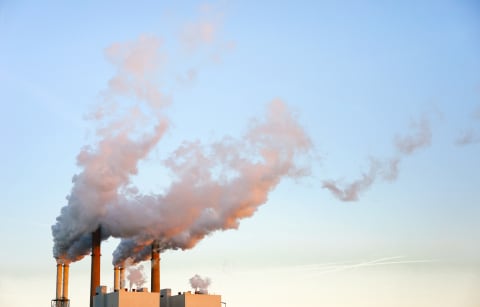Advertisement
5 New Discoveries That Should Shape The Way We Approach Climate Change

Through the chaos that was 2020, scientists continued to dig into how human activity is altering the climate and vice versa.
Last week, a group of 57 leading researchers presented 10 of their most important new findings to the United Nations in the hopes that they will help shape climate policy moving forward. "This series is a critical part of our mission to get the latest science to decision-makers in an accessible format to help accelerate transitions to sustainability," Wendy Broadgate, Global Hub Director in Sweden for Future Earth, one of the three research consortiums behind the report, said in a statement.
Beyond being essential for policymakers, these discoveries can also help inform how us everyday folks should be thinking about and reacting to climate change. Check out the complete list here, and sift through takeaways from the top five findings below:
More accurate climate models reinforce the need to cut carbon emissions, not just offset them.

Modeling what our planet could look and feel like decades into the future is ongoing work. As models continued to become more accurate last year, scientists actually amended their previous estimates for potential global warming. They decided that the lower range of temperatures was no longer in the realm of possibility. Once the amount of CO2 in the atmosphere doubles preindustrial levels (as it's expected to do), researchers now say we can expect a range of 2.3 to 4.5°C of warming, compared to the previous range of 1.5 to 4.5°C.
"This means that moderate emissions reduction scenarios are less likely to meet the Paris temperature targets than previously anticipated," the report reads, necessitating more aggressive emissions reductions. Offsetting initiatives that draw carbon out of the atmosphere over time will not be enough—we need to majorly slow our rate of carbon emissions first and foremost.
- Personal action: Fly less, as air travel comes with a hefty carbon emissions price tag. (One bright side of 2020 is you've probably already been doing this one.)
- Community action: Write to your local representatives about the need for a green COVID recovery that reinvigorates the economy while keeping carbon emissions down.
Melting permafrost is becoming a major issue.
Most of our existing climate modeling doesn't account for carbon emissions that could potentially come from melting permafrost—the layer of ground that's historically remained frozen under glaciers. As the rate of glacier loss speeds up (again, thanks largely to rising carbon emissions), scientists are increasingly concerned that thawing permafrost will release large amounts of long-buried stores of carbon and other potent greenhouse gases into the atmosphere. Thawing permafrost also has the potential to bring long-buried infectious diseases back up to the surface. Yikes. Expect to hear more about these frozen lands, and how we can keep them frozen, into the future.
- Personal action: Calculate your carbon footprint (this tool does it for you in two minutes) to get a better sense of where you can be cutting personal emissions.
- Community action: Decarbonize your local energy source by lobbying for clean power in your city or state using this guide.
Deforestation in tropical forests is harming the world's ability to self-regulate.

As we emit more and more carbon into the atmosphere, the ground beneath our feet naturally draws some of it back down into the earth. This new report estimates that 30% of human CO2 emissions are now reabsorbed by plant matter. Old-growth forests have grown especially good at gobbling up carbon—but when they're chopped down, they release it back into the atmosphere.
This means that beyond ruining priceless natural ecosystems, the deforestation and burning that we've been seeing in the Amazon and Asia are reducing the amount of carbon these natural ecosystems can store, further exacerbating the climate crisis even more than researchers previously realized.
- Personal action: Buy your food—particularly your meat—from local producers where you can. A lot of the land that's being deforested abroad is being cleared for farming and ranching.
- Community action: Vote with your dollar, and don't support companies that have been tied to deforestation. In their new book, Paris Agreement negotiators Christiana Figueres and Tom Rivett-Carnac write that almost all tropical deforestation is driven by demand for beef, soy, palm oil, and wood, so pay extra attention to these categories.
Extreme weather events are threatening already vulnerable communities.
We've long known that climate change is intensifying extreme weather events, and last year we got more clarity on where they're expected to hit in the future. Researchers are now predicting that heavy rainfall will be more likely in already humid areas, while drought will affect arid regions like the Middle East, North Africa, southern Europe, and Australia. In other words, storms will likely exacerbate existing climate weather patterns—and those who live in poor areas are disproportionately affected by them. Moving forward, more attention needs to be paid to the millions of people who could be displaced by these storms.
- Personal action: Stay on top of extreme weather events around the world, and use them as examples as you talk to friends and family about the increasing importance of climate action.
- Community action: Consider donating to organizations helping those who have lost their homes due to climate change, like Climate Refugees and the Environmental Justice Foundation.
The mental toll of climate change is even worse than we thought.

"There is growing evidence that changing climatic conditions are adversely affecting mental health, including increased risk of stress and clinical disorders (trauma, anxiety, PTSD, or depression) and can even result in an increased risk of suicide," the report reads.
We now have some language to speak about the unique toll that climate change plays on mental health: There's eco-anxiety, the feeling of dread for a hotter future, and solastalgia1, the distress of watching your natural home environment change before your eyes. Moving forward, people—especially young people and those who live in communities on the front lines of climate change—will need more resources to help them cope with these traumatic emotions.
- Personal action: Consider how you can use eco-anxiety as fuel for eco-action. Here's a guide to how to talk about eco-action with your family and with younger kids in particular.
- Community action: Engage with youth-led climate groups and support them in their efforts for a brighter future. Start with this list of plans for the planet that teen activists have for 2021.